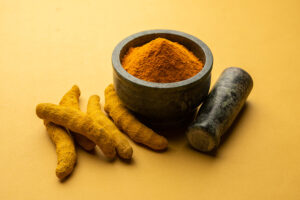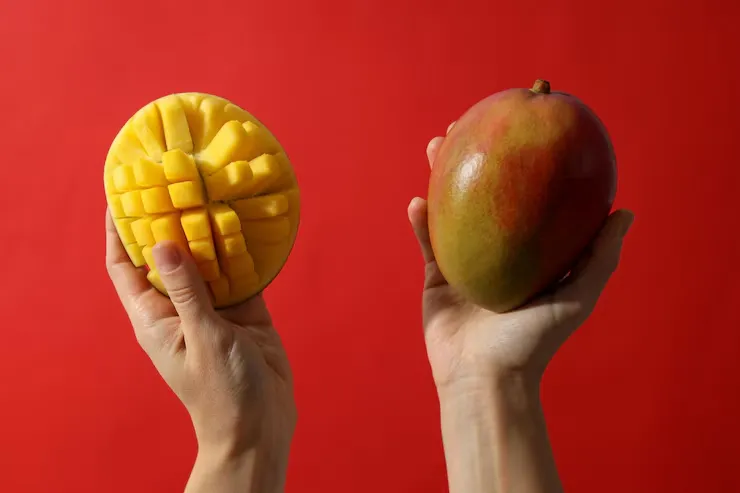Mangoes are sweet, juicy, and loaded with nutrition, but they also come with a surprising number of questions. Can dogs eat them? Do they really cause acne? Is it okay to eat mangoes during pregnancy or with milk? and a common one: can I drink water after eating mango? In this guide, we clear up the most common myths and reveal the facts behind every bite.
Mangoes Are A Nutritional Powerhouse
Before diving into the myths and what lies beyond them, let’s acknowledge the mango’s impressive nutritional profile. One cup (165g) of sliced mango delivers:
- Vitamins Galore: Over 60% of your Daily Value (DV) of immune-boosting Vitamin C, 20% DV of vision-protecting Vitamin A (as beta-carotene), and significant B vitamins (especially B6 and folate).
- Fibre Champion: About 3 grams of dietary fibre, aiding digestion and promoting satiety.
- Antioxidant Arsenal: Packed with polyphenols like mangiferin, quercetin, and gallic acid, fighting oxidative stress and inflammation.
- Mineral Mix: Provides potassium, magnesium, and copper.
This potent combination supports immune function, eye health, digestion, skin vitality, and much more. Now, let’s tackle those common myths about eating mangoes one by one.
Can Dogs Eat Mango Skin, Dried Mangoes, Ripe Mango Pulp, Mango Pit
Sharing food with our dogs is a natural impulse, especially when they give us those pleading eyes. But is mango a safe treat?
The Core Fact: Yes, ripe mango flesh is generally safe and even healthy for most dogs in moderation. The sweet fruit provides vitamins (A, B6, C, E), fibre, and antioxidants, beneficial for their immune system and digestion.
Mango Myths and Side Effects You Should Know:
Can Dogs eat mango pit? The pit is just a harmless seed.
Fact: Not True. The large, hard pit is a severe choking hazard and can cause intestinal blockage in dogs if swallowed. It also contains trace amounts of cyanide-producing compounds, though a dog would need to crush and consume multiple pits for toxicity; the physical obstruction is the immediate danger. Always remove the pit completely before offering mango to your dog.
Can dogs eat mango skin? Can dogs eat mango peel?
Fact: Not Recommended. While not inherently toxic like grapes, the skin (or peel) is tough, fibrous, and difficult for dogs to digest. It poses a significant choking hazard and a high risk of causing intestinal blockage or upset stomach (vomiting, diarrhoea). The skin also contains urushiol, the same compound found in poison ivy, which can cause mild to severe mouth or digestive tract irritation in sensitive dogs. Always peel the mango thoroughly before giving the flesh to your dog.
Can dogs eat dried mango?
Fact: Proceed with Extreme Caution. Plain, unsweetened, unsulphured dried mango in very tiny amounts might be okay for some dogs. However, most commercially available dried mango is loaded with added sugar, which is unhealthy and can lead to obesity and dental problems. Some brands use artificial sweeteners like xylitol, which is highly toxic and potentially fatal to dogs. The concentrated sugar and fibre can also cause digestive upset.
Fresh, peeled, pitted mango flesh is a far safer and healthier choice. Avoid dried mango unless you are 100% certain it contains ONLY mango and no additives, especially xylitol, and offer only a tiny piece occasionally.
- Moderation is Key: Mango is high in natural sugar. Too much can lead to stomach upset, diarrhoea, or contribute to weight gain and associated health problems like diabetes for dogs. Treat mango as an occasional snack, not a dietary staple. A few small cubes (depending on your dog’s size) once or twice a week is sufficient.
- Introduce Slowly: If it’s your dog’s first time, offer a very small piece and monitor for any signs of allergy or digestive upset (itching, hives, vomiting, diarrhoea).
Can I Eat Mango During Pregnancy
Pregnancy is a time when you are the most vigilant about the food you eat, even if it is a naturally occurring fruit like mangoes. So this concern raises the question: Are mangoes a friend or foe during this special time?
The Core Fact: Yes, ripe mangoes are generally safe and highly nutritious for pregnant women. They are an excellent source of:
- Vitamin C: Crucial for immune function, iron absorption, and baby’s tissue development.
- Vitamin A (as Beta-Carotene): Vital for foetal vision development, cell growth, and maternal immune health.
- Folate (Vitamin B9): Absolutely essential before and during early pregnancy to prevent neural tube defects (like spina bifida) in the developing baby.
- Fibre: Helps combat common pregnancy constipation.
- Potassium: Helps regulate fluid balance and blood pressure.
Addressing Concerns & Myths Around Pregnancy and Mango Consumption:
Can I eat mango during pregnancy?
Fact: Yes! Enjoy ripe mangoes as part of a balanced pregnancy diet. They provide vital nutrients beneficial for both mother and baby.
Can I eat mango pickle during pregnancy?
Fact: Tread Carefully. This is more nuanced than fresh mango.
- Homemade Pickles: Carry a significant risk of bacterial contamination (like listeria or botulism) if not prepared, fermented, and stored exactly correctly. Listeria infection during pregnancy can be very serious for the unborn baby. Generally best avoided.
- Commercially Pasteurized Pickles: If they are shelf-stable and clearly state they are pasteurized, the risk is lower. However, they are often extremely high in sodium (salt) and can contribute to water retention and high blood pressure (preeclampsia risk). They may also be very spicy, potentially causing heartburn. Consume pasteurized mango pickle only very occasionally and in small amounts, if at all. Fresh mango is a far superior choice.
- “Heat” Myth: Some traditional beliefs categorise mangoes as “heat-producing” foods that might cause miscarriage or harm the baby. There is no scientific evidence supporting this claim. The nutrients in mangoes are beneficial.
- Gestational Diabetes: Mangoes have a medium Glycemic Index (GI), meaning they raise blood sugar moderately. Women with gestational diabetes need to monitor their carbohydrate intake, including fruit. Portion control is key (e.g., 1/2 cup sliced mango). Pairing it with a protein or healthy fat (like a handful of nuts) can help blunt the blood sugar spike. Always follow your doctor’s or dietitian’s advice.
- Allergies: If you have a known mango allergy, obviously avoid it during pregnancy. If you’re trying it for the first time while pregnant, start with a small amount.
- Hygiene: Always wash mangoes thoroughly under running water before cutting to remove any surface contaminants or pesticide residues. Use clean utensils and cutting boards.
Does Mangoes Cause Cystic Acne
The persistent belief that mangoes cause acne is widespread. Let’s peel back the layers of this myth.
Does mango cause acne? Why does mango cause acne?
- The Core Myth: “Eating mangoes directly causes pimples and breakouts.”
- The Scientific Reality: Mangoes themselves are NOT a direct or common cause of acne for most people. Acne is primarily driven by:
- Hormones: Androgens stimulating oil (sebum) production.
- Excess Sebum Production.
- Clogged Pores: Dead skin cells blocking hair follicles.
- Bacteria: C. acnes bacteria proliferating in clogged pores.
- Inflammation.
Where Does the Myth Come From? Debunking the Links:
- Sugar Content: Ripe mangoes contain natural sugars (fructose). High-Glycemic Index (GI) diets (loaded with refined sugars and carbs) can potentially worsen acne in some individuals by increasing insulin levels, which may boost androgen activity and sebum production. However, mangoes have a medium GI (around 51-56). Eating a reasonable portion of mango as part of a balanced diet is unlikely to trigger acne in most people. Blaming mango specifically oversimplifies the complex dietary picture.
- “Heat” Concept (Traditional Medicine): Similar to the pregnancy myth, some traditional systems associate mangoes with internal “heat,” believed to manifest as skin inflammation like acne or rashes. This lacks robust scientific validation. Individual sensitivities might exist, but it’s not a universal rule.
- Allergic Reactions/Rashes: Some people can be allergic to mango skin or sap (related to the urushiol in poison ivy), causing contact dermatitis (itchy rash) around the mouth or on hands when handling the fruit. This is distinct from common acne (comedones, pustules) and usually occurs only with skin contact, not from eating the flesh. Peeling carefully and washing hands after handling can prevent this.
- Topical Use – The Bright Side!: Mango butter, extracted from the seed kernel, is a rich emollient packed with vitamins A, C, and E. It’s fantastic for moisturising dry skin, improving elasticity, and promoting a healthy glow. Its fatty acids help repair the skin barrier. Far from causing acne, topical mango butter can be beneficial for skin hydration and health.
The Verdict on Mango and Skin: Enjoy mangoes! If you have acne-prone skin, focus on an overall healthy diet (low in refined sugars/high-GI foods), good skincare, stress management, and consult a dermatologist. Don’t single out mangoes unless you personally notice a consistent, direct link between eating them and breakouts — which is rare and likely individual.
Mangoes & Food Combinations: the Do’s and Don’ts
Mangoes come with a lot of dietary dos and don’ts, passed down through generations. But what does science have to say? Let’s see.
Can we eat mango at night?
Myth: “Eating mangoes at night causes indigestion/weight gain/is unhealthy.”
Fact: There’s no inherent reason why a healthy person cannot enjoy mango at night. The digestive system functions 24/7. The key considerations are:
- Portion Size: Eating a very large, sugary snack (like multiple mangoes) right before bed could potentially cause indigestion or a blood sugar spike that disrupts sleep for some individuals. It also adds significant calories.
- Individual Tolerance: If you experience heartburn or reflux, acidic or sugary foods close to bedtime might worsen it.
- Overall Diet: A small portion of mango as part of a balanced evening meal or as a reasonable dessert is perfectly fine for most people. Focus on how it fits into your total daily calorie and nutrient intake.
Can we eat mango with milk?
Myth: “Mango and milk are incompatible and cause digestive issues, skin problems, or toxicity.”
Fact (The Science): There is no scientific proof that combining ripe mango and milk is harmful for the vast majority of people. This belief comes from Ayurvedic principles of food combining, suggesting “opposite” qualities (mango “heating,” milk “cooling”) cause imbalance. While some individuals might experience temporary bloating or discomfort if they have difficulty digesting lactose (milk sugar) or consume an unusually large amount, this is not specific to the mango-milk combination. For instance, mango lassi (a yoghurt/milk and mango smoothie) is a beloved and digestible treat enjoyed by millions globally without issue. If you enjoy mango with milk or yoghurt and feel fine, continue enjoying it.
Can You Drink Water, Cold Drinks, or Milk After Eating Mango?
The Big Myth:
“Drinking water (especially cold water) immediately after eating mango causes stomach cramps, indigestion, or other stomach related concerns.“
The Facts:
- Hydration is Essential: Drinking water after eating any food, including mango, is perfectly safe and actually beneficial. Mango contains fibre; water aids its movement through the digestive tract, preventing constipation. It also helps with overall hydration.
- Temperature Sensitivity (Individual): Some people with very sensitive digestive systems (like those with Irritable Bowel Syndrome – IBS) might experience temporary cramping if they consume a large amount of very cold liquid immediately after eating. This is due to the temperature shock, not the mango-water combination itself. Room temperature water is always a gentle choice.
- Cold Drinks/Soda: While not dangerous when combined with mango, sugary sodas add empty calories and can contribute to blood sugar spikes and weight gain. Opting for water is healthier.
- Milk After Mango: As stated above, there’s no scientific basis for avoiding milk after mango. Enjoy a lassi or latte if you wish.
Why the Myth Persists:
This likely originates from:
- Unripe Mangoes: Unripe mangoes contain high levels of amylase inhibitors and more acid. Amylase inhibitors temporarily interfere with starch digestion. Consuming large amounts of unripe mango followed by a lot of water might cause some temporary bloating or discomfort in sensitive individuals, but this is not applicable to ripe mangoes.
The Verdict: Drink water freely after eating mangoes. It’s healthy. Cold drinks or milk are also not forbidden based on science. Listen to your own body; if cold liquids bother you, choose room temperature.
Summing Up
The mango is a gift of nature, bursting with flavour and potent nutrition. By separating the myths from the scientific facts, we can fully appreciate and safely enjoy this king of fruits:
- Share (Carefully) with Your Pet Dog: Offer small amounts of peeled, pitted ripe mango flesh as an occasional treat. Avoid skin, peel, pits, and dried mango with additives.
- Nourish Pregnancy: Enjoy ripe mangoes for their folate, vitamins, and fibre. Avoid homemade pickles; be cautious with commercial ones.
- Rejoice for Skin: Don’t fear mangoes causing acne. Their nutritional profile supports skin health. Blame refined sugar, not this whole fruit. Try topical mango butter for hydration.
- Combine Confidently: Eat mangoes any time of day in reasonable portions. Pair them freely with milk or yoghurt. Drink water after eating them; it’s beneficial. Dismiss the outdated warnings about cold drinks.
The real dangers lie in the pit for dogs, unpasteurized pickles for pregnant women, and excessive sugar for everyone.
Practice moderation, prioritise fresh, ripe fruit, handle it hygienically, and savour the sweet, juicy truth: Mangoes are a delicious and healthy addition to most diets. Now that you know the facts, there’s nothing stopping you. Enjoy your mangoes the way it is meant to be savoured.






